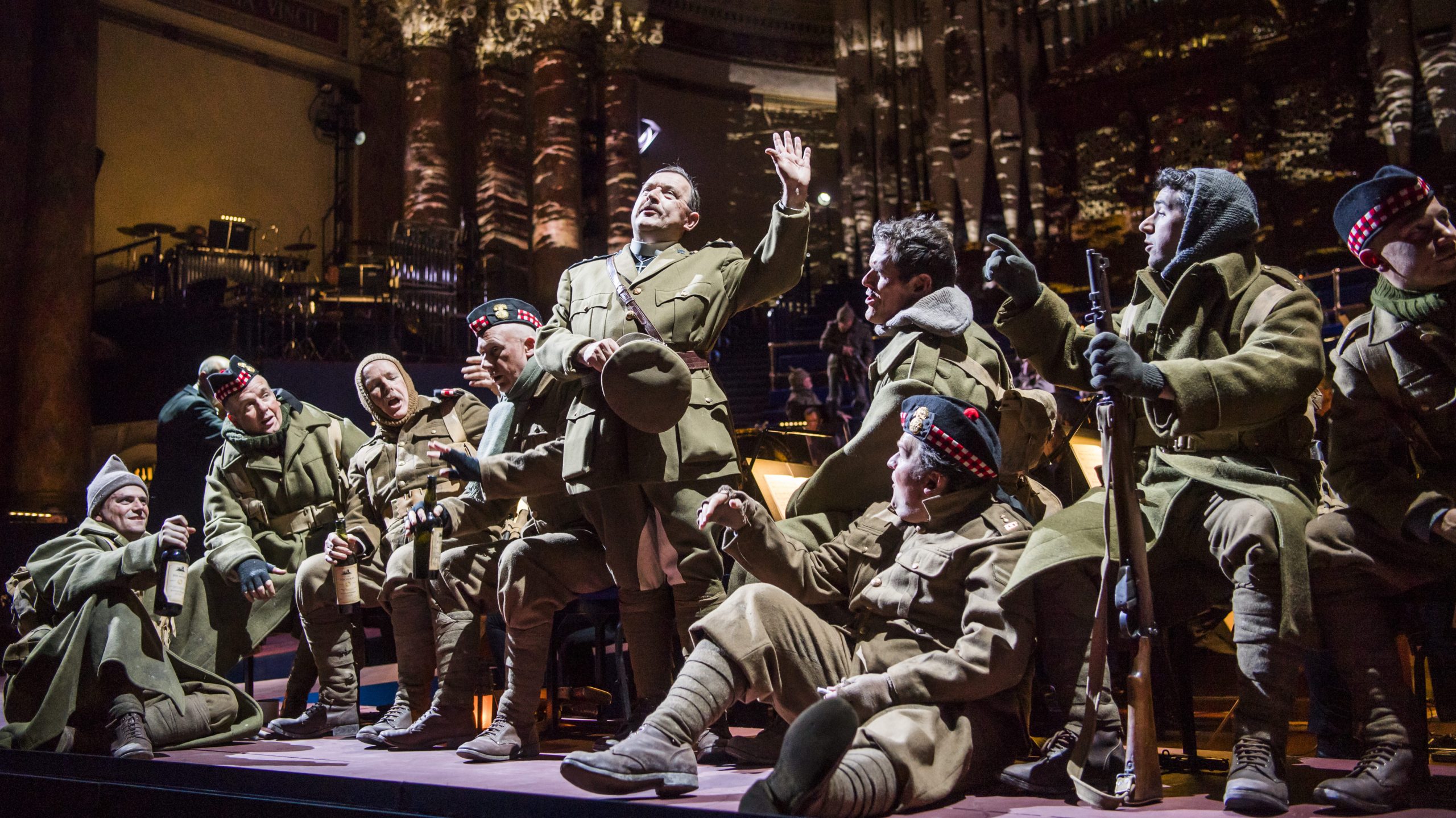The Christmas Truce of 1914 is a familiar story, retold in works as diverse as Michael Foreman’s children’s story War Game, Sainsbury’s centenary commemorative Christmas advert, and a throw-away comment in Blackadder Goes Forth. It has become a firm part of World War I mythology, but can a further retelling avoid cliché? Opera North’s UK premiere of Kevin Puts’ Pulitzer Prize Winning Opera Silent Night (based on Christian Carion’s screenplay for the film Joyeux Noël) presents a powerful emotional experience with the power to move you – and no matter how many times a tale is told, if the story is important, then it merits such repetition.
Throughout the performance, the profound and raw humanity that survived the devastation of war and the terrors of trench life shines through. The trilingual nature of Mark Campbell’s libretto, sung in English, French, and German, emphasises the shared community which exists even in the depths of wartime despair. The soldiers speak about similar issues, hopes and preoccupations – many even share a language and had familial ties with their ‘enemy’. This helps to illustrate the nuanced relationship even between allied French and Scottish battalions: although fighting on the same side of the war, until the Truce it is clear they are not necessarily fighting for the same reasons, and each has a different emotional investment in the conflict.
The epic nature of this story is reflected through its setting in the grand, Baroque-style Leeds Town Hall, with original World War One battle and Christmas Truce video footage projected against its large marble pillars and huge organ. The images dance over the heads of the wonderful Opera North orchestra, contributing to the quasi-cinematic feel of the whole experience. Not only does this technique help form the battle scenes and large-scale action sequences, it’s incredibly effective in reminding us that despite the story of the Christmas Truce often feeling more like fiction than fact, it was indeed reality and history.
Despite Silent Night being set in a very important and specific moment in history, it still feels like a story very relevant to our time. Now, instead of a World War, Europe is being torn apart by Brexit, the rise of the far right, and the refugee crisis. As in 1914, we are told by so-called ‘patriotic’ (often right-wing) news outlets and politicians that we are different, divided, being taken advantage of by other nations, and in danger of being overtaken by ‘foreigners’. The story of the Christmas Truce reminds us that when we actually interact with others in a normal way – whether that is by playing football, singing, talking, or sharing rations – these previously perceived barriers are broken down: we realise that we are all human and there is more that unites us than divides us.
The soldiers’ disenchantment is heavily emphasised throughout the opera – few of the French, Scottish or German men believe that the war has anything to do with the safety and prosperity of ordinary citizens or individual countries. Rather, it is driven by powerful men in governments and companies. The truth of this is underlined at the end; while the opposing soldiers get on well together individually, once the commanding officers find out about the truce from an ambitious and morally suspect soldier, friendships forged during the Christmas truce are rebranded as “fraternising with the enemy.” Orders are given to recommence fighting with companies ominously being moved to the front line. Symbolically, the truce is broken by a Scottish soldier who mistakenly kills his allied French soldier, wearing a German’s coat given as a sign of friendship. This illustrates the ridiculous nature of war where uniforms matter more than the people within them.
The combined power of 100 strong male operatic voices – perfect for the ensemble style performance – and the ever-accomplished Opera North orchestra fill every note with emotion, providing the beating heart of the production. Listening to the emotional goodbyes, both to family left behind at home and those dying on No Man’s Land, you are taken on an emotional journey. Power and importance are given to both the epic and everyday events of war – even the loss of a letter or photograph of a loved one takes on major importance in the language of opera.
The ending is sombre and muted, eschewing the sturm und drang finale typical of a powerful orchestral setting. However, this felt right – we are left quietly to contemplate the horrors we know lasted almost four more years. Although the battle between these specific regiments is over, more fighting awaits them on the other side of the trench.



